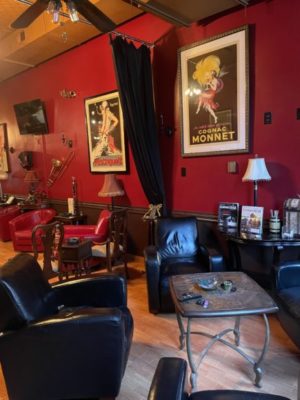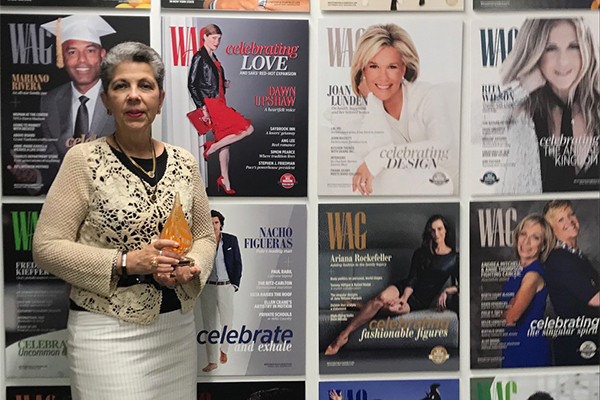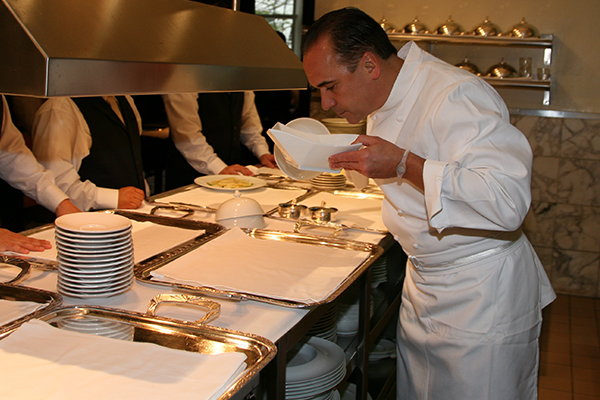
When the music business started to become unpredictable owing to the shift to digital online music 15 or so years ago, music marketing supremo, talent scout and cigar aficionado Nick Casinelli decided to quit the industry and open his own business. In November 2007, he launched the Connecticut Cigar Co. in downtown Stamford. “From a marketing point of view,” says Casinelli, a soft-spoken Stamford native, whose flowing gray locks perfectly evince his music-industry background, “I approach the cigar business like the entertainment business. Cigars are a big form of entertainment.”
That “entertainment” might start with watching Max Compres, the company”™s Dominican Republic-born cigar roller, at work at his high table in the window of the store, rolling the Connecticut Cigar Co.”™s own cigars, which it sells alongside established retail brands from countries like the Dominican Republic, Nicaragua and Honduras.
“Max has been our chief roller from day one,” says Casinelli. “In fact, he was rolling for six months prior to us opening in 2007, to make sure we got exactly the blend we wanted.”
Rolling cigars, which involves wrapping, filling and binding the tobacco leaves before placing them into molds before they are finished is an art that takes a lot of knowledge of tobacco, as well as experience, of course. There is also a degree of experimentation, Casinelli explains, finding new and nuanced blends to suit customers”™ tastes. No two types of cigar should be the same, he says, with the age of the tobacco, the blend, the rolling process and the size of the cigar all playing their parts in creating a unique, even “boutique” smoke. Constantly, Casinelli returns to the comparison between cigar manufacture and winemaking, where grape varietal, vintage, length of time during which the wine is aged in whichever type of barrel ”” all coupled with the vintner”™s special skills ”” produce wines that are individual and distinct.
And just as a wine label is no guarantee of a wine”™s quality but can nevertheless be intriguing and inviting, a work of art in its own right, so, too, with the packaging and “labeling” of cigars. Cigar boxes are often beautiful. Metal cigar tubes may be tantalizing, even sexy. (Perhaps this was another aspect of the cigar business that appealed to the marketing man in Casinelli.)

Photograph by Cristian Apruzzese.
Like the company”™s own cigars, its imported brands encompass a variety of blends, with tobacco coming from Mexico, Costa Rica, Ecuador, Cameroon and ”” not least ”” Connecticut. It may come as a surprise to learn that tobacco has been grown in the Constitution State for well over 100 years. Soil enriched with nutrients from the Connecticut River, coupled with hot summers and high humidity, make for excellent growing conditions, although unlike the tropical and subtropical growing regions, Connecticut has only one growing season.
While the store”™s inventory seems large and varied, Casinelli points out that he can carry only a fraction of what he would like to. He has to compete with online retailers, a universal struggle faced by so many small, independent, brick-and-mortar storekeepers across the board.
On the other hand, online buyers don”™t get to hold and smell the product ”” or to imbibe the atmosphere of a store like the CCC. Casinelli buys based on quality, value, what he thinks will sell, what he himself enjoys and what he can confidently recommend. A Prensado from manufacturer Alec Bradley, a flavorful blend of Honduran and Nicaraguan tobacco that is a “small well-constructed cigar and not too strong and not too light;” a “benchmark” Romeo y Julieta, which Casinelli guarantees is “always going to be fine, with a reasonable price point”; and an Avo cigar with a consistency that is “as good as it gets” are among his best sellers.
Cigars, he points out, too, are “situational.” An inexpensive cigar, something you can chew on, like a relatively thin, CCC house-brand Corona, might be a great smoke with a morning cup of coffee at the computer, or while cutting the grass, but an evening with cigar-smoking friends around the firepit, or a formal dinner, might call for a bigger, longer-burning cigar and likely one with a stronger, richer profile.
As for what to drink, Casinelli”™s best advice is to stick with what you enjoy. While red wine traditionally makes a great cigar accompaniment, Casinelli says, if you don”™t like red wine ”” cigar or no cigar ”” it”™s never going to do it for you. But as a general rule, think about a regular beer with a simple, straightforward cigar, he advises, moving up the ranks with a “better” cigar, and on to red wine, Scotch, single malts and brandies (what Casinelli calls “the brown liquors”) with the pricier, more complex smokes.
Another amenity online retailers canӪt provide is a space to smoke. At the rear of the companyӪs retail store is an atmospheric membersӪ cigar lounge, known as NickӪs Cigar Social. Renovated by Casinelli himself during the long months of Covid when the store was closed, this ambient space, where soft drinks and snacks are available, features rich, maroon-colored walls, hardwood floors, deep and comfortable leather club chairs, a wonderful collection of vintage jazz instruments and assorted jazz fedoras and trilbies left casually on side tables. A magnificent, vintage Art Deco poster advertises the appearance of Josephine Baker at the Th̩atre des Champs-Elys̩es, Paris, in February 1927.
Great jazz and good cigars seem to be natural bedfellows and, to that end, the lounge regularly hosts live jazz performances, as well as blues, singer-songwriter, classic rock and standup comedy nights. Themed movie and sports nights are a feature, too, and lately, burlesque has entered the lineup. “It”™s quite the night of entertainment, the burlesque,” Casinelli reveals, with a twinkle in his eye. (Nonmembers may use the lounge with the purchase of at least two cigars.) The company will also attend events offsite, setting up its cigar rolling station with a cigar roller and an attendant, a popular sideshow at weddings, country club outings, golf and charity events and special birthdays ”” basically, wherever cigars are socially acceptable.
Back at the lounge, meanwhile, members can store their own liquor, along with cigars, in private lockers. (Connecticut law prohibits the sale of alcohol on the premises but allows the consumption of it) and the lounge is open 24 hours, with member access directly from the street via a code. It”™s such a wonderfully sophisticated, cultivated, clubby and urbane setup, it could have even the most smoke-averse, jazz-phobic, teetotal moralist scrambling to sign the membership application form.
For more, visit ctcigarco.com.

















